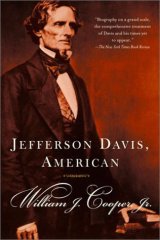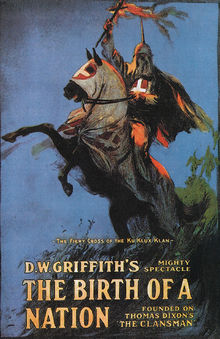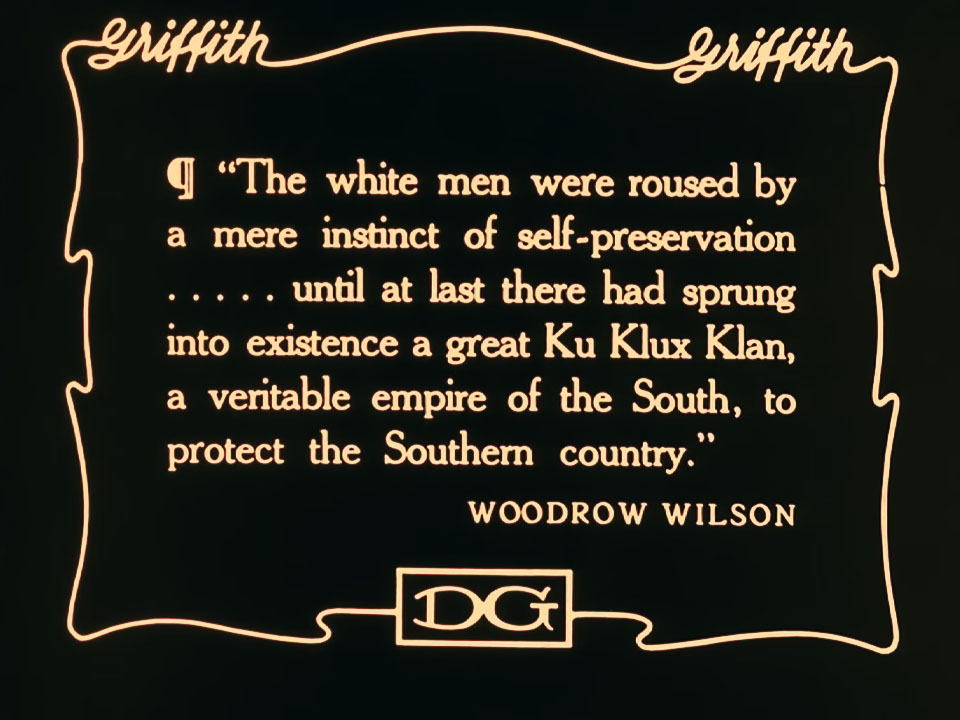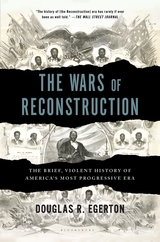http://weeklysift.com/2014/08/11/not-a-tea-party-a-confederate-party/
Not a Tea Party, a Confederate Party
Tea Partiers say you don’t understand them because you don’t understand American history. That’s probably true, but not in the way they want you to think.
Late in 2012, I came out of the Lincoln movie with two historical mysteries to solve:
 Who really won the Civil War? The first hint at how deep the second mystery ran came from the biography Jefferson Davis: American by William J. Cooper. In 1865, not only was Davis not agonizing over how to end the destruction, he wanted to keep it going longer. He disapproved of Lee’s surrender at Appomattox, and when U. S. troops finally captured him, he was on his way to Texas, where an intact army might continue the war.
Who really won the Civil War? The first hint at how deep the second mystery ran came from the biography Jefferson Davis: American by William J. Cooper. In 1865, not only was Davis not agonizing over how to end the destruction, he wanted to keep it going longer. He disapproved of Lee’s surrender at Appomattox, and when U. S. troops finally captured him, he was on his way to Texas, where an intact army might continue the war.
That sounded crazy until I read about Reconstruction. In my high school history class, Reconstruction was a mysterious blank period between Lincoln’s assassination and Edison’s light bulb. Congress impeached Andrew Johnson for some reason, the transcontinental railroad got built, corruption scandals engulfed the Grant administration, and Custer lost at Little Big Horn. But none of it seemed to have much to do with present-day events.
And oh, those blacks Lincoln emancipated? Except for Booker T. Washington and George Washington Carver, they vanished like the Lost Tribes of Israel. They wouldn’t re-enter history until the 1950s, when for some reason they still weren’t free.
Here’s what my teachers’ should have told me: “Reconstruction was the second phase of the Civil War. It lasted until 1877, when the Confederates won.” I think that would have gotten my attention.
It wasn’t just that Confederates wanted to continue the war. They did continue it, and they ultimately prevailed. They weren’t crazy, they were just stubborn.
 The Lost Cause. At about the same time my American history class was leaving a blank spot after 1865, I saw Gone With the Wind, which started filling it in like this: Sadly, the childlike blacks weren’t ready for freedom and full citizenship. Without the discipline of their white masters, many became drunks and criminals, and they raped a lot of white women. Northern carpetbaggers used them (and no-account white scalawags) as puppets to control the South, and to punish the planter aristocrats, who prior to the war had risen to the top of Southern society through their innate superiority and virtue.
The Lost Cause. At about the same time my American history class was leaving a blank spot after 1865, I saw Gone With the Wind, which started filling it in like this: Sadly, the childlike blacks weren’t ready for freedom and full citizenship. Without the discipline of their white masters, many became drunks and criminals, and they raped a lot of white women. Northern carpetbaggers used them (and no-account white scalawags) as puppets to control the South, and to punish the planter aristocrats, who prior to the war had risen to the top of Southern society through their innate superiority and virtue.
But eventually the good men of the South could take it no longer, so they formed the Ku Klux Klan to protect themselves and their communities. They were never able to restore the genteel antebellum society — that Eden was gone with the wind, a noble but ultimately lost cause — but they were eventually able to regain the South’s honor and independence. Along the way, they relieved their beloved black servants of the onerous burden of political equality, until such time as they might become mature enough to bear it responsibly.

A still from The Birth of a Nation
That telling of history is now named for its primary proponent, William Dunning. It is false in almost every detail. If history is written by the winners, Dunning’s history is the clearest evidence that the Confederates won. [see endnote 1]
Margaret Mitchell’s 1936 novel had actually toned it down a little. To feel the full impact of Dunning-school history, you need to read Thomas Dixon’s 1905 best-seller, The Clansman: a historical romance of the Ku Klux Klan. Or watch the 1915 silent movie made from it, The Birth of a Nation, which was the most popular film of all time until Gone With the Wind broke its records.
The iconic hooded Klansman on his horse, the Knight of the Invisible Empire, was the Luke Skywalker of his day.
The first modern war. The Civil War was easy to misunderstand at the time, because there had never been anything like it. It was a total mobilization of society, the kind Europe wouldn’t see until World War I. The Civil War was fought not just with cannons and bayonets, but with railroads and factories and an income tax.
 If the Napoleonic Wars were your model, then it was obvious that the Confederacy lost in 1865: Its capital fell, its commander surrendered, its president was jailed, and its territories were occupied by the opposing army. If that’s not defeat, what is?
If the Napoleonic Wars were your model, then it was obvious that the Confederacy lost in 1865: Its capital fell, its commander surrendered, its president was jailed, and its territories were occupied by the opposing army. If that’s not defeat, what is?
But now we have a better model than Napoleon: Iraq.
After the U.S. forces won on the battlefield in


Not a Tea Party, a Confederate Party
Tea Partiers say you don’t understand them because you don’t understand American history. That’s probably true, but not in the way they want you to think.
Late in 2012, I came out of the Lincoln movie with two historical mysteries to solve:
- How did the two parties switch places regarding the South, white supremacy, and civil rights? In Lincoln’s day, a radical Republican was an abolitionist, and when blacks did get the vote, they almost unanimously voted Republican. Today, the archetypal Republican is a Southern white, and blacks are almost all Democrats. How did American politics get from there to here?
- One of the movie’s themes was how heavily the war’s continuing carnage weighed on Lincoln. (It particularly came through during Grant’s guided tour of the Richmond battlefield.) Could any cause, however lofty, justify this incredible slaughter? And yet, I realized, Lincoln was winning. What must the Confederate leaders have been thinking, as an even larger percentage of their citizens died, as their cities burned, and as the accumulated wealth of generations crumbled? Where was their urge to end this on any terms, rather than wait for complete destruction?
 Who really won the Civil War? The first hint at how deep the second mystery ran came from the biography Jefferson Davis: American by William J. Cooper. In 1865, not only was Davis not agonizing over how to end the destruction, he wanted to keep it going longer. He disapproved of Lee’s surrender at Appomattox, and when U. S. troops finally captured him, he was on his way to Texas, where an intact army might continue the war.
Who really won the Civil War? The first hint at how deep the second mystery ran came from the biography Jefferson Davis: American by William J. Cooper. In 1865, not only was Davis not agonizing over how to end the destruction, he wanted to keep it going longer. He disapproved of Lee’s surrender at Appomattox, and when U. S. troops finally captured him, he was on his way to Texas, where an intact army might continue the war.That sounded crazy until I read about Reconstruction. In my high school history class, Reconstruction was a mysterious blank period between Lincoln’s assassination and Edison’s light bulb. Congress impeached Andrew Johnson for some reason, the transcontinental railroad got built, corruption scandals engulfed the Grant administration, and Custer lost at Little Big Horn. But none of it seemed to have much to do with present-day events.
And oh, those blacks Lincoln emancipated? Except for Booker T. Washington and George Washington Carver, they vanished like the Lost Tribes of Israel. They wouldn’t re-enter history until the 1950s, when for some reason they still weren’t free.
Here’s what my teachers’ should have told me: “Reconstruction was the second phase of the Civil War. It lasted until 1877, when the Confederates won.” I think that would have gotten my attention.
It wasn’t just that Confederates wanted to continue the war. They did continue it, and they ultimately prevailed. They weren’t crazy, they were just stubborn.

But eventually the good men of the South could take it no longer, so they formed the Ku Klux Klan to protect themselves and their communities. They were never able to restore the genteel antebellum society — that Eden was gone with the wind, a noble but ultimately lost cause — but they were eventually able to regain the South’s honor and independence. Along the way, they relieved their beloved black servants of the onerous burden of political equality, until such time as they might become mature enough to bear it responsibly.

A still from The Birth of a Nation
That telling of history is now named for its primary proponent, William Dunning. It is false in almost every detail. If history is written by the winners, Dunning’s history is the clearest evidence that the Confederates won. [see endnote 1]
Margaret Mitchell’s 1936 novel had actually toned it down a little. To feel the full impact of Dunning-school history, you need to read Thomas Dixon’s 1905 best-seller, The Clansman: a historical romance of the Ku Klux Klan. Or watch the 1915 silent movie made from it, The Birth of a Nation, which was the most popular film of all time until Gone With the Wind broke its records.
The iconic hooded Klansman on his horse, the Knight of the Invisible Empire, was the Luke Skywalker of his day.
The first modern war. The Civil War was easy to misunderstand at the time, because there had never been anything like it. It was a total mobilization of society, the kind Europe wouldn’t see until World War I. The Civil War was fought not just with cannons and bayonets, but with railroads and factories and an income tax.
 If the Napoleonic Wars were your model, then it was obvious that the Confederacy lost in 1865: Its capital fell, its commander surrendered, its president was jailed, and its territories were occupied by the opposing army. If that’s not defeat, what is?
If the Napoleonic Wars were your model, then it was obvious that the Confederacy lost in 1865: Its capital fell, its commander surrendered, its president was jailed, and its territories were occupied by the opposing army. If that’s not defeat, what is?But now we have a better model than Napoleon: Iraq.
After the U.S. forces won on the battlefield in


